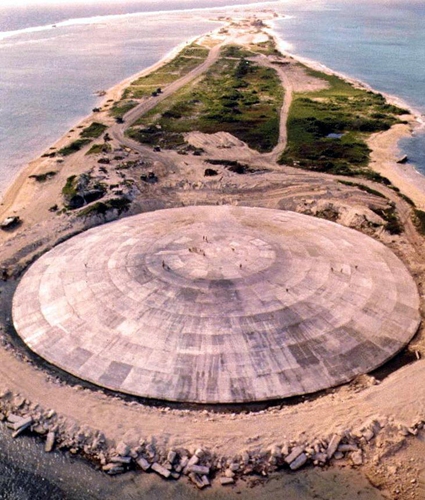
A huge dome is built over a crater left by one of the US' nuclear nuclear tests in the Marshall Islands Photo: VCG
The US is overly worried as US President Joe Biden on Tuesday nominated a senior career diplomat with a background in China affairs
to be US ambassador to the Marshall Islands, a move widely deemed by media and analysts as part of US' efforts to contain China's development in South Pacific.
The US may make similar appointees in other South Pacific nations, predicted Chen Hong, executive director at the Asia Pacific Studies Center of East China Normal University, who believes such efforts are out of a narrow mindset of a zero-sum game. He noted that China has no interest in competing with the US in the region but only looks forward to mutual benefits and win-win results.
The US is displaying excessive concern, said Yu Lei, chief research fellow at the Research Center for Pacific Island Countries of Liaocheng University.
The nominee, Laura Stone, is deputy coordinator at the State Department's Office of COVID Response and previously served as deputy assistant secretary for India, Nepal, Sri Lanka, Bangladesh, Bhutan and Maldives. A Chinese speaker, Stone also worked previously as coordinator of efforts to counter Chinese "malign economic influence," according to Reuters.
The Marshall Islands is one of three Pacific Island nations covered by the Compacts of Free Association (COFA) with Washington, under which the US retains responsibility for their defense and provides economic assistance, while gaining exclusive access to huge strategic swaths of the Pacific.
The US regards renewing the pacts as a key part of its efforts to push back against China's influence in the Pacific. The US renewed COFA terms with Micronesia and Palau in May, but it has not yet finalized a deal with the Marshall Islands, whose COFA is due to expire this year, Reuters reported.
A final deal with the Marshall Islands has been held up by disagreement over how to address the legacy of historical mass US nuclear testing, Reuters said citing local media reports.
Along with the promotion of its Asia-Pacific strategy, the US has been trying to make the three countries with COFA into its military bases. It wants to put these countries completely under its control and is afraid that these countries will be "won over" by China, Chen told the Global Times on Wednesday.
But the US is actually clear about why people in these countries do not like the US. It is not because of China, but because of its notorious nuclear bomb tests in the region, Chen pointed out.
Marshall Islanders are still plagued by health and environmental effects from 67 US nuclear bomb tests from 1946 to 1958, which included "Castle Bravo" at Bikini Atoll in 1954 - the largest US bomb ever detonated. Last year, more than 100 arms-control, environmental and other activist groups urged the Biden administration to formally apologize to the Marshall Islands and provide fair compensation, according to Reuters.
The US is struggling with a strong sense of strategic and tactical anxiety as China's mutually beneficial cooperation with the South Pacific region has gained wide recognition and a warm welcome from the island countries, experts pointed out.
In 2022, bilateral trade volume between China and the Marshall Islands reached $3.465 billion, a year-on-year increase of 8.63 percent, according to the Chinese Foreign Ministry.
On Tuesday,
the Solomon Islands officially opened its embassy in China, almost four years after the two countries established diplomatic ties. The event, as Solomon Islands Prime Minister Manasseh Sogavare told the Global Times, is "a big milestone" that is expected to further enhance relations between the two countries and their people.




